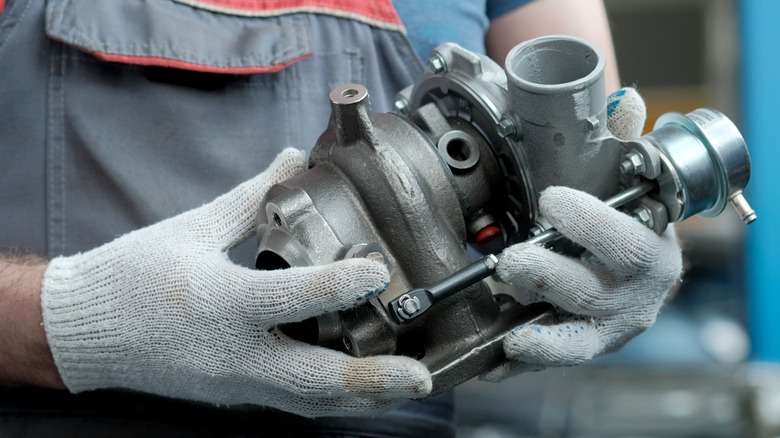How Do Electric Turbochargers Work, And Are They Better Than Traditional Turbos?
Deciding between adding a turbocharger or a supercharger to your car can be tough, depending on what kind of performance you want to get out of it. Even once you do decide (or maybe before), you'll need to check to see if your engine can even handle a turbo.
Now, on top of all that, you can also choose between a more traditional turbocharger and one that's electric. There may be scenarios where the decision is made for you, like when you buy a new car and it comes with a turbo, but having to add one after the fact is more probable. Assuming you want to go through the process in the first place, of course.
Turbochargers boast a couple of tantalizing benefits for many drivers, after all. When done right they can improve an engine's overall performance by a fairly significant amount. On top of this is the increased (minimal, but it adds up) fuel efficiency. But how much better, if at all, is an electric turbo over a more common model?
Under the hood with turbochargers
Engine turbochargers are most often added to (sometimes even included with) small engines as a way to push their horsepower beyond their factory limits. With the added benefit of not eating through your fuel supply at an alarming rate — at least not any faster than your engine would regularly use it.
In essence, the turbocharger acts as a compressor. The gasses produced by the engine cause the turbo's turbine to spin, which then allows it to push more air into the engine and increase overall power output. Turbos generally end up providing an approximate 30- to 40-percent increase in engine power, as well as a lot more torque (twisting force) that can improve acceleration, hauling power, and your car's ability to handle inclines.
Turbos have their drawbacks, however. They can be quite expensive to install and maintain, for one thing. There are also common instances where you'll experience lag between acceleration and feeling the turbo kick-in, referred to as turbo lag, which won't hurt your engine but it will sometimes take a little bit for the device to get up to speed. You'll also need to be mindful of the heat. It should generally be fine so long as you don't overwork the engine very often, but pushing things too hard or for too long can cause major damage to the turbo itself, or even directly to the engine.
How electric turbos do it differently
Electric turbochargers (or rather, fully-electric ones) are kind of a misnomer. Electric turbos are a real thing, certainly, but currently they're more like traditional turbochargers that have been adapted to run on electricity.
The primary difference between classic and electric turbos comes down to what gets it moving. Unlike a traditional turbocharger, which uses exhaust gasses to spin itself up, electric turbos utilize an electric motor (the compressor is also electric). Since its energy comes from a separate motor, the electric turbo doesn't need the engine to hit certain speeds before it can start to do its thing — thus eliminating turbo lag.
However, electric turbos do have their own brand of drawbacks compared to more traditional models. Much like regular turbos, the electric variety can be rather costly to install and maintain. They also won't have as much of an impact on your car's gas mileage compared to a regular turbo, although the difference between the two is usually only a small percentage (like 2-percent or so).
Which turbo is best?
There are benefits and downsides to either kind of turbocharger, so it mostly comes down to you. The only wrong choice you can make here is to buy a "too good to be true" cheap electric turbo online, which is usually a waste of money, or to try and install a turbo (electric or traditional) that won't play nicely with your car's engine.
Do you have enough in the budget for an electric model, which is generally more expensive? Is your biggest priority an increase in engine performance without having to experience any turbo lag? Or do you value fuel efficiency more than performance? How soon do you need to make a decision?
The thing about electric turbochargers is that the technology is still relatively young. This means there's both room for improvement and refinement, and with enough popularity and use the prices may start to come down. If you like the sound of an electric turbo but are put off by the cost or the comparable lack of efficiency, there's no harm in waiting if you can spare the time.



